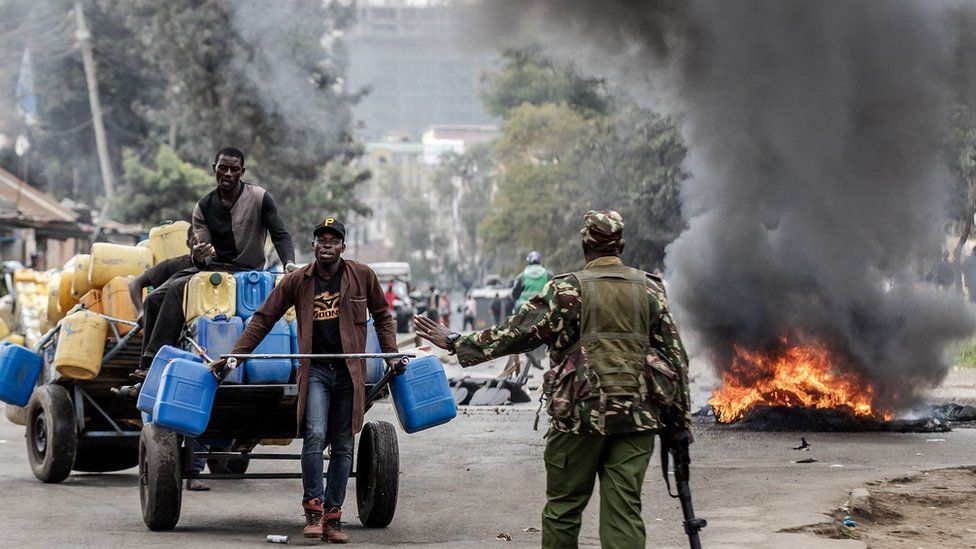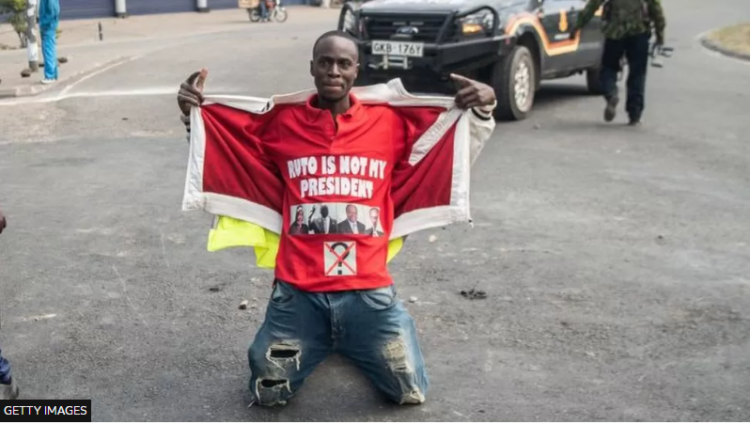Kenya is braced for the latest in a series of opposition protests against the rising cost of living and tax hikes, which have turned violent, with at least 24 people killed in recent months.
During last year's presidential election, James Wainaina, a taxi driver in the capital, Nairobi, voted for William Ruto, who portrayed himself as the candidate of what he called the "hustler nation" - ordinary people struggling to get by.
But now Mr Wainaina feels betrayed and supports the protests.
Since President Ruto came to office, prices have continued to soar, while his government has raised taxes.
Mr Ruto says the extra revenue is needed for escalating debt repayments and to fund projects to create jobs, but the tax rises have made life even harder for the poorest Kenyans.
Mr Wainaina's daughter, a high school student, recently stayed at home for three weeks because he was unable to pay her 14,000-shilling ($100; £75) school fees.
Mr Wainaina says his business has declined because of the cost-of-living crisis.
He gets fewer clients and nearly all his earnings now go into simply keeping his car on the road.
Five years ago, he could make up to 4,000 shillings a day, enough to cover his basic necessities, including school fees, he says.
He laments there are times he now goes home with just 500 shillings after expenses "which is not enough to fuel the car the next day".
"It is very difficult for us," he says. The government, he adds, has not made it easy for small businesses, especially the "hustlers" .
Mr Wainaina says they were lied to.
"It doesn't seem like things will be better, you see [the president] lied to us, we are being oppressed, things are becoming difficult. When the cost of fuel goes up, the price of everything else goes up, even electricity. Things are becoming worse."
Even those who still support the government are expressing "a considerable level of unhappiness with the current state of affairs", according to the latest survey by a local polling firm, Tifa.
Its survey shows that 56% of Kenyans think the country is heading in the wrong direction, up from 48% in March.
The polling firm suggests the discontentment may be feeding into the support for opposition protests.

Government data show that the prices of some key food products have risen considerably in the 12 months to June - with the staples - maize, grain and flour - increasing by up to 30%, rice and potatoes by nearly 20% and sugar costing nearly 60% more.
Despite that, in the finance bill which became law on 1 July, the government doubled the value-added tax on fuel products from 8% to 16%, and introduced a 1.5% housing levy on employees' basic pay, with an equivalent amount paid by the employer.
The levy is supposed to go to a fund to construct homes for the less well-off while creating jobs.
Besides that, taxes on sales (Turnover Tax) were tripled to 3% for small businesses, and income tax for high-earning employees was raised from 30% to a maximum of 35%.
The government defends the new taxes - now temporarily suspended by a court - as necessary because of the country's high debts.
It accuses the previous administration of massively adding to the country's debt burden by spending huge amounts of money on infrastructure projects that did not help the ordinary Kenyan.
Mr Ruto served in the previous government as deputy president, but he distanced himself from it after falling out with then-President Uhuru Kenyatta.
He and government officials have told Kenyans that paying the taxes is a short-term "sacrifice" for the future of the country.
But Mr Wainaina is not convinced. Likewise, Edwin Simiyu, a boda boda (motorcycle taxi) rider in Kiambu town near the capital regrets voting for the current administration.
"[The president] said we should give him one year and then we'd see positive changes. Now when he is in, he changes the tune and says we should wait for years before things become better. We are suffering, we have been totally betrayed, we've been forgotten," he says.
Charles Kaindo is hard at work in the same town selling second-hand clothes on a pavement.
The hawker tells the BBC it is unfortunate the government has broken its promises.
He says there will be a time when people will say "enough is enough" - explaining that hard-working people will turn to crime and others "may even take their lives when the suffering becomes too much".

But not everyone thinks that higher taxes are a bad thing.
Jane Njeri, an accountant in the private sector, says she does not envy the government - which needs the money to pay off the huge debts that Kenya owes.
The Kenya shilling has been steadily weakening against the US dollar in recent months, making the cost of debt repayments even higher.
"It's not going to be an overnight thing. We are at a bad place, depreciating shilling, debt and unemployment," she says.
The disquiet in Kenya arises from the "sense of contradiction" between the "hustler narrative" about easing the cost of living that was sold during the campaign and the "reality where we are seeing taxes being increased on everyday goods", according to Ken Gichinga, chief economist at business consulting firm Mentoria Economics.
He says rather than focusing on consumption taxes that raise the cost of living, the government should do more to spur private-sector growth.
He argues against the government housing projects being funded by the new levy, saying it is unlikely to resolve either the housing or unemployment problem.
"Lower interest rates, lower taxation, and loosen regulation. Do those three and the whole economy will be able to create jobs. Let the free market work."
However, economic analyst Odhiambo Ramogi says he is convinced that that the president's intentions are noble - though the methods "are wrong".
He says the government should first cut waste before asking ordinary Kenyans to pay more.
The government accepts this point - David Ndii, its chief economic adviser, has acknowledged on Twitter that the government was "wasteful".
Ndindi Nyoro, chairman of the parliamentary budget committee, told the BBC that the government's tax plan was to ensure that government was not digging a bigger debt hole by borrowing more. He said the focus was on creating a balance to ensure what "will make Kenyans take part in baking the national cake".
But a growing number of Kenyans do not think this is working and are taking to the streets to make their point.
Latest Stories
-
Tanzania president warns ‘meddling’ Kenyan activists
35 minutes -
Nigeria’s fierce political rivals share joke at pope’s inaugural mass
47 minutes -
World-first gonorrhoea vaccine launched by NHS England as infections soar
57 minutes -
EU plans €2 fee on small parcels in hit to Shein and Temu
1 hour -
Doubts over whether Brits can use EU e-gates this summer
1 hour -
Trump pressures Republicans to back his ‘big beautiful’ tax bill
2 hours -
Zelensky accuses Russia of ‘buying time’ to stall truce talks
2 hours -
Man who helped smuggle more than 3,000 people into Europe jailed
2 hours -
Jennifer Lopez sued in copyright case for posting photos of herself
2 hours -
US congresswoman charged with assault outside immigration centre
3 hours -
Court orders mental evaluation for extradited Togolese robbery suspect
3 hours -
Police destroy 120 changfang machines at Wassa Gyapa
4 hours -
‘Order from above’ keeps traders on the streets – Dr Oduro Osae
4 hours -
Lax bylaw enforcement to blame for traders’ street chaos – Dr Oduro Osae
5 hours -
Dram Oil requires recoveries from Alfapetro Ghana Ltd in alleged contract breach
5 hours

